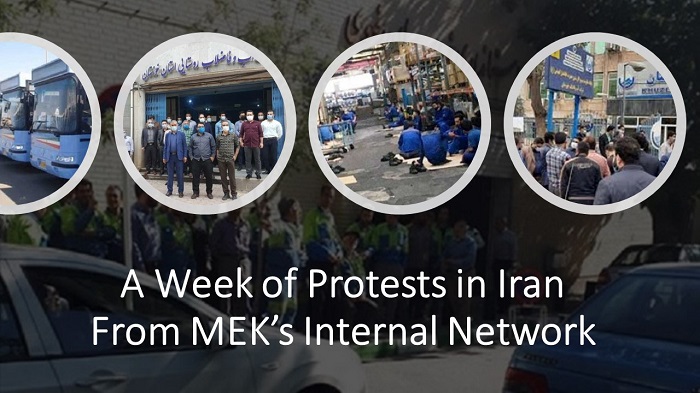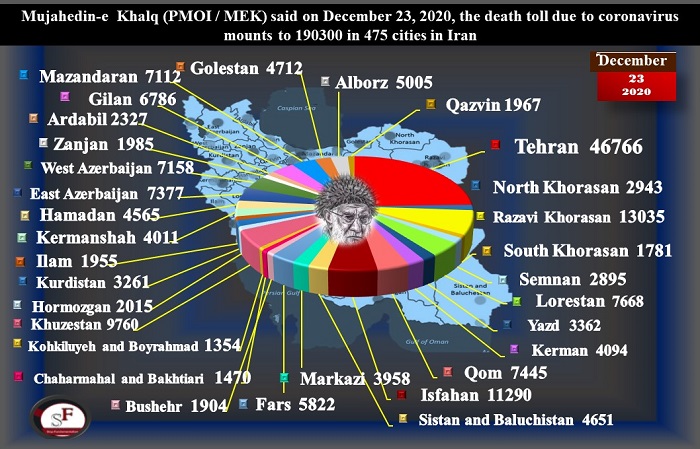
The National Council of Resistance of Iran (NCRI), and the People’s Mojahedin Organization of Iran (PMOI / MEK Iran) reported through their internal network in various Iranian cities have seen strikes and protests by workers in the past week, over unpaid wages, a lack of insurance, and other issues. Let’s a look at just a few of the biggest.
On Sunday, (PMOI / MEK Iran) supporters from the Khuzestan province reported that employees of the Khuzestan rural water and sewage systems continued their strike outside the company building to demand payment of their insurance premiums and wages, as well as the uncertain status of their jobs.
Nov. 17- Khuzestan Province, SW #Iran
Employees of the Khuzestan Rural Water and Sewage Co. gathered outside the company building today to demand 5 months of their delayed paychecks and benefits. #IranProtests pic.twitter.com/TeuDeRXkrn— Iran News Wire (@IranNW) November 17, 2020
On Saturday, (PMOI / MEK Iran) supporters from the city of Mashhad reported that railway workers and their families held a protest in Mashhad, northeast Iran, over being forced to work a dangerous job during a pandemic. They say that the local bus and train fleets have been stopped but cross-country trains are still running because the companies want to maximize profit, even when travel between areas is how the coronavirus spreads. Protesting workers have been threatened with lay-offs.
On Thursday, Iran Khodro automaker workers stopped working for hours over an increase in working hours, which has left employees exhausted. They’ve tried to negotiate for a decrease in working hours, but authorities refused.
(#PMOI/#MEK #Iran) supporters from the city of Mashhad reported that railway workers and their families held a protest in Mashhad, northeast Iran, over being forced to work a dangerous job during a pandemic. pic.twitter.com/yGTvL8U6Md
— MEK Iran (Mujahedin-e Khalq) (@MEK_Iran) December 24, 2020
The workers said: “The employer has added two hours of overtime for workers in hard and harmful jobs to increase the production. Workers in hard and harmful jobs should work 36 hours instead of 44 hours a week while we, the assembly hall workers, work eight hours a day instead of six.”
They continued: “The company has put extra pressure on workers in recent months to increase production. Long working hours can increase the risk of accidents in factories and reduce workers’ sensitivity to hygiene issues in the workplace.”
They called on their employer to respect workers’ rights, as managers and supervisors have refused to decrease working hours without legal mandates.
(#PMOI /#MEK #Iran) supporters from the city of #Urmia reported that bus drivers in Urmia, northwest Iran, have gone on strike outside the Urmia municipality over officials’ refusing to pay the workers’ insurance.#WeStand4FreeIran pic.twitter.com/GXp67Xhf4r
— MEK Iran (Mujahedin-e Khalq) (@MEK_Iran) December 24, 2020
Meanwhile, (PMOI / MEK Iran) supporters from the city of Urmia reported that bus drivers in Urmia, northwest Iran, have gone on strike outside the Urmia municipality over officials’ refusing to pay the workers’ insurance.
One driver said: “We are tired of the officials’ promises (Bus Transportation organization) because the supplementary insurance and oil, tires and other facilities were supposed to be paid by the end of November. But not only this did not happen, but they also talk to the bus drivers with arrogance.”
He explained that passage numbers have dropped by half this year because of Covid-19 fears and given the high maintenance cost of buses, including spare parts, it costs more for them to work than not.

He said: “There is a double pressure on drivers and the officials should pay attention to this important issue by providing support facilities.”
Over 190,300 people have died of the coronavirus in Iran, according to the reports by the Iranian opposition The National Council of Resistance of Iran (NCRI), and the People’s Mojahedin Organization of Iran (PMOI / MEK Iran).
and People’s Mojahedin Organization of Iran – MEK IRAN – YouTube







